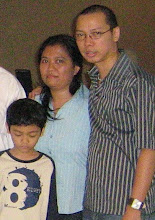
The Four Stages of a Religious Spirit
By Mark Pfeifer www.markandnicki.com
Matthew strategically wrote his gospel account to show how the Jewish leaders rejected Jesus as their Messiah. Their debates with our Lord increased until it reached a climax in the Twelfth Chapter. This was the turning point. In the first eleven chapters, Jesus spoke openly about the Kingdom of God being offered to national Israel. After chapter twelve, however, He only spoke in dark parables. Explaining Himself to His disciples, He quoted the prophesy of Isaiah,
"And in them the prophecy of Isaiah is fulfilled, which says: 'Hearing you will hear and shall not understand, and seeing you will see and not perceive; for the hearts of this people have grown dull. Their ears are hard of hearing, and their eyes they have closed, lest they should see with their eyes and hear with their ears, lest they should understand with their hearts and turn, So that I should heal them.”
Isaiah 6:9-10
What was it about the Jewish leaders that made them resistant to the Kingdom of God? What caused them to reject what God had offered them? What did Jesus see in them that made Him conclude that they would NEVER receive it? It was a religious spirit!
Using Chapter 12 in Matthew as a guide, we can see the four stages of a religious spirit in action...
Stage #1: JUDGEMENT V-1 & 2
The Pharisees watched Jesus’ disciples pick corn in the fields and eat it on the Sabbath. This infuriated them because not participating in any labor on the Sabbath was a rule that they kept devotedly. Looking down their theological noses at the munching disciples, they took a position of moral superiority and began judging their actions.
At its root, the religious spirit is supported by pride. It makes us feel holier than others because we keep rules that they don’t. Perched atop this morally superior position, we compare ourselves to others using our religious standards as a guide. When they fall short of this measurement, we set ourselves up as their judge and draw conclusions about them which gives us the perceived right to criticize them.
Stage #2: ACCUSATION V-9 & 10
The Jewish leaders in the synagogue wanted to catch Jesus in a sin. The desire to catch Him doing something wrong was greater than their desire to see a poor man healed. So they used the man with a withered hand to try and catch Jesus doing something for which they could criticize their Messiah.
The religious spirit is sneaky! It feels compelled to get the lowdown on people in order to reveal their true motive. The cynical nature attached to a religious spirit can not believe that people would actually have a pure heart and right motive in doing something kind since deep down, those who operate with a religious spirit are always putting on a show for people.
Stage #3: DESTRUCTION V-14
The Pharisees saw that they were getting nowhere in their trickery. This led them to begin creating plans to destroy Jesus. At this point, all bets were off. They were reaching a point of no return. Instead of receiving from Him, they were more interested in shutting Him up.
People who are dominated by a religious spirit despise a challenge. The root of their extreme reactions is fear. They fight to preserve what to them is the most important ingredient to their walk with God, the law. What makes this even more deceptive in that their actions are based on a zeal for God. This is why Paul said in Romans 10:2, “For I bear them witness that they (Jews) have a zeal for God, but not according to knowledge.” This zeal for God mixes with a fear of change and creates passion. When this passion boils over, plans are be made and actions justified to eliminate any perceived threat.
Stage #4: HARD HEARTEDNESS V-23 & 24
The Pharisees had crossed the line. From this point forward, Jesus knew that their hard hearts would keep them from receiving the new form of the Kingdom of God. That’s why from this chapter forward, Jesus only spoke in parables. He saw that they had reached a point of no return.
When a person reaches this point it is impossible for them to humble themselves, repent and be forgiven. Jesus went on to talk about the unpardonable sin in the next few verses. What was happening? He was describing the only type of sin that God can not forgive - sin that is unconfused. When the religious spirit has a person at this level, they will never be forgiven because they see no need to repent. In their eyes, they have no sin. They keep all rules. It’s all those other fellows who need to be forgiven. Someone who is blinded by a religious spirit sees no need of such loathing.
Conclusion:
In identifying the four stages of a religious spirit from Matthew 12, we have also touched on four root traits of the religious spirit. Did you catch them? They are:
(1) Pride
(2) Cynicism
(3) Fear
(4) Blindness
Sometimes it’s easier to recognize those traits operating in our lives than it is to look in the mirror and see a religious spirit.









Tidak ada komentar:
Posting Komentar